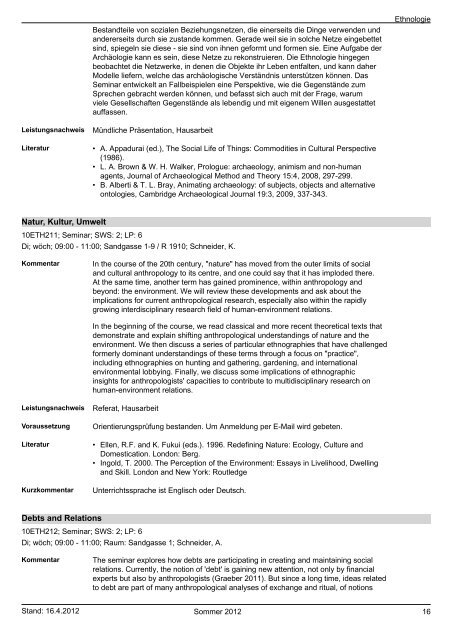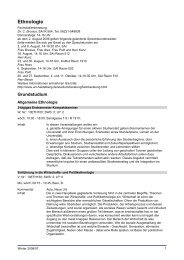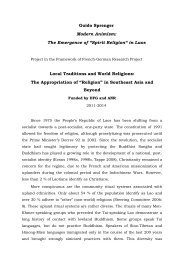Modul 2 - Institut für Ethnologie Universität Heidelberg
Modul 2 - Institut für Ethnologie Universität Heidelberg
Modul 2 - Institut für Ethnologie Universität Heidelberg
Erfolgreiche ePaper selbst erstellen
Machen Sie aus Ihren PDF Publikationen ein blätterbares Flipbook mit unserer einzigartigen Google optimierten e-Paper Software.
Bestandteile von sozialen Beziehungsnetzen, die einerseits die Dinge verwenden und<br />
andererseits durch sie zustande kommen. Gerade weil sie in solche Netze eingebettet<br />
sind, spiegeln sie diese - sie sind von ihnen geformt und formen sie. Eine Aufgabe der<br />
Archäologie kann es sein, diese Netze zu rekonstruieren. Die <strong>Ethnologie</strong> hingegen<br />
beobachtet die Netzwerke, in denen die Objekte ihr Leben entfalten, und kann daher<br />
Modelle liefern, welche das archäologische Verständnis unterstützen können. Das<br />
Seminar entwickelt an Fallbeispielen eine Perspektive, wie die Gegenstände zum<br />
Sprechen gebracht werden können, und befasst sich auch mit der Frage, warum<br />
viele Gesellschaften Gegenstände als lebendig und mit eigenem Willen ausgestattet<br />
auffassen.<br />
Leistungsnachweis Mündliche Präsentation, Hausarbeit<br />
Literatur • A. Appadurai (ed.), The Social Life of Things: Commodities in Cultural Perspective<br />
(1986).<br />
• L. A. Brown & W. H. Walker, Prologue: archaeology, animism and non-human<br />
agents, Journal of Archaeological Method and Theory 15:4, 2008, 297-299.<br />
• B. Alberti & T. L. Bray, Animating archaeology: of subjects, objects and alternative<br />
ontologies, Cambridge Archaeological Journal 19:3, 2009, 337-343.<br />
Natur, Kultur, Umwelt<br />
10ETH211; Seminar; SWS: 2; LP: 6<br />
Di; wöch; 09:00 - 11:00; Sandgasse 1-9 / R 1910; Schneider, K.<br />
Kommentar In the course of the 20th century, "nature" has moved from the outer limits of social<br />
and cultural anthropology to its centre, and one could say that it has imploded there.<br />
At the same time, another term has gained prominence, within anthropology and<br />
beyond: the environment. We will review these developments and ask about the<br />
implications for current anthropological research, especially also within the rapidly<br />
growing interdisciplinary research field of human-environment relations.<br />
Leistungsnachweis Referat, Hausarbeit<br />
In the beginning of the course, we read classical and more recent theoretical texts that<br />
demonstrate and explain shifting anthropological understandings of nature and the<br />
environment. We then discuss a series of particular ethnographies that have challenged<br />
formerly dominant understandings of these terms through a focus on "practice",<br />
including ethnographies on hunting and gathering, gardening, and international<br />
environmental lobbying. Finally, we discuss some implications of ethnographic<br />
insights for anthropologists' capacities to contribute to multidisciplinary research on<br />
human-environment relations.<br />
Voraussetzung Orientierungsprüfung bestanden. Um Anmeldung per E-Mail wird gebeten.<br />
Literatur • Ellen, R.F. and K. Fukui (eds.). 1996. Redefining Nature: Ecology, Culture and<br />
Domestication. London: Berg.<br />
• Ingold, T. 2000. The Perception of the Environment: Essays in Livelihood, Dwelling<br />
and Skill. London and New York: Routledge<br />
Kurzkommentar Unterrichtssprache ist Englisch oder Deutsch.<br />
Debts and Relations<br />
10ETH212; Seminar; SWS: 2; LP: 6<br />
Di; wöch; 09:00 - 11:00; Raum: Sandgasse 1; Schneider, A.<br />
Kommentar The seminar explores how debts are participating in creating and maintaining social<br />
relations. Currently, the notion of 'debt' is gaining new attention, not only by financial<br />
experts but also by anthropologists (Graeber 2011). But since a long time, ideas related<br />
to debt are part of many anthropological analyses of exchange and ritual, of notions<br />
<strong>Ethnologie</strong><br />
Stand: 16.4.2012 Sommer 2012 16






